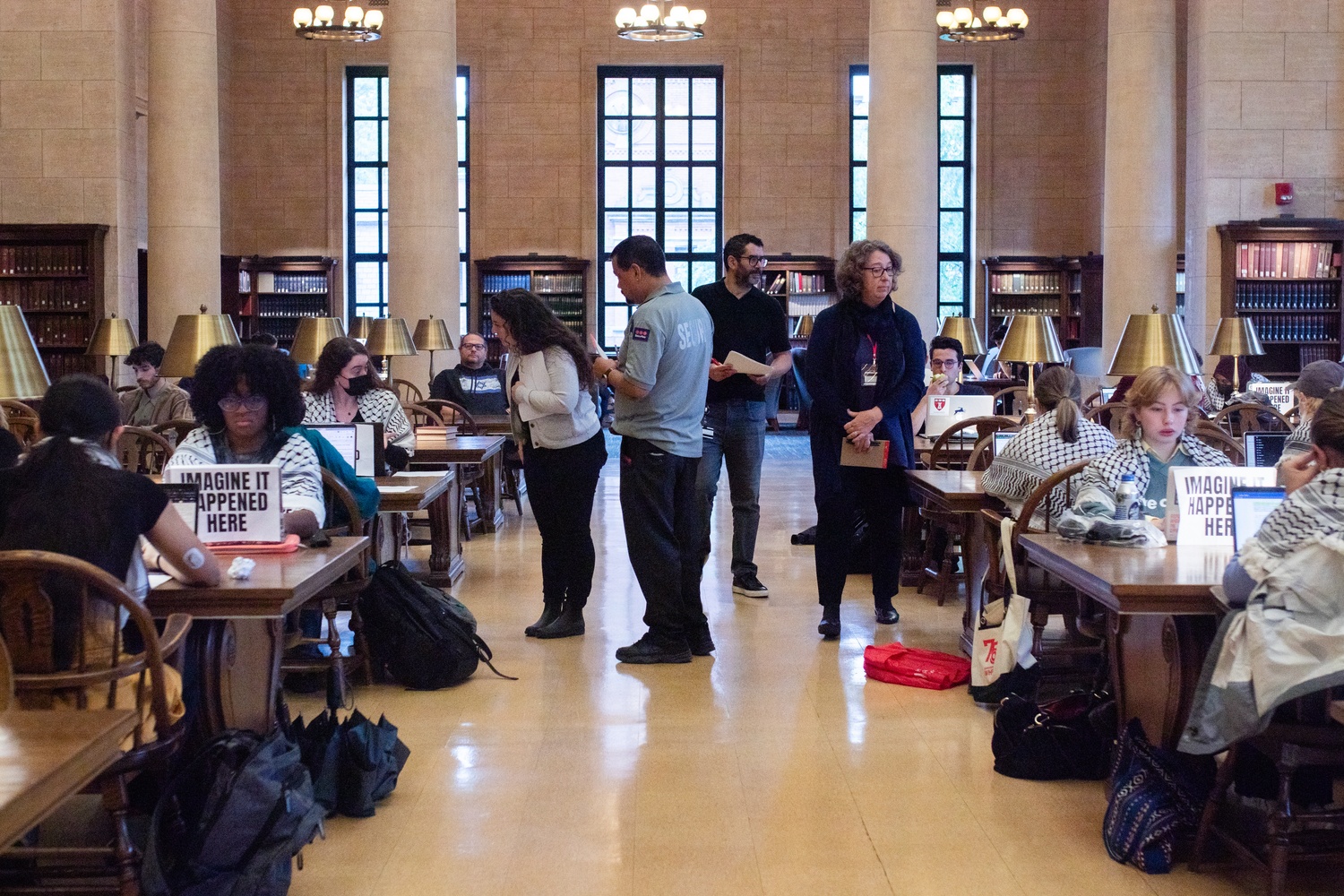
News
Summers Will Not Finish Semester of Teaching as Harvard Investigates Epstein Ties

News
Harvard College Students Report Favoring Divestment from Israel in HUA Survey

News
‘He Should Resign’: Harvard Undergrads Take Hard Line Against Summers Over Epstein Scandal

News
Harvard To Launch New Investigation Into Epstein’s Ties to Summers, Other University Affiliates

News
Harvard Students To Vote on Divestment From Israel in Inaugural HUA Election Survey
Pro-Palestine Students Banned From Widener Library for 2 Weeks After ‘Study-In’ Protest

More than 12 pro-Palestine student protesters were banned from entering Widener Library for two weeks after they staged a silent “study-in” protest at the library late last month, according to an email obtained by The Crimson.
The email, which was sent to students on Wednesday, informed them that their “access to Widener Library will be suspended from today until October 16” for violating the rules and regulations around library use outlined in the University-wide Statement on Rights and Responsibilities.
Students barred from the library will still be able to access online materials and borrowing privileges, and can request to pick up materials from Widener at other libraries on campus, according to the email.
In a Wednesday evening social media post, organizers for the Harvard Undergraduate Palestine Solidarity Committee decried the library ban and criticized Harvard administrators for targeting “even the most non-disruptive displays of solidarity.”
“Betraying the historic value of libraries to social change, library admin worked with Harvard admin to do what they’ve done all year: CRIMINALIZE ALL ADVOCACY FOR PALESTINIAN LIBERATION,” PSC organizers wrote.
A spokesperson for Harvard Libraries declined to comment for this article, citing a policy of refraining from commenting on individual matters related to Library policy.
The ban comes after roughly 30 pro-Palestine student activists staged an “emergency study-in” at Widener on Sept. 21, to protest the Israeli military’s airstrikes in Lebanon. During the demonstration, which lasted an hour, students donned keffiyehs — traditional Palestinian scarves — and studied with posters taped to their computers.
The demonstration was silent, and other students in the Widener reading room continued to study alongside the pro-Palestine protesters.
During the study-in, library staff jotted down the names and Harvard University ID numbers of several student protesters and passed out sheets of paper stating that libraries are not permissible spaces for student protests.
That warning was repeated in the Wednesday emails notifying students of their two-week suspension.
Though College spokesperson Jonathan Palumbo initially stated on Sept. 22 that no students had been referred for disciplinary action, the decision to temporarily ban students from Widener indicates that Harvard’s administration is adopting a more stringent approach to protests that do not abide by the University’s policies.
“This Widener Library suspension is not intended to supplant any potential discipline by your School for violations of the University Statement on Rights and Responsibilities or other Harvard policies,” Widener administrators wrote in their emails on Wednesday.
The administrators wrote that they will keep records of the violations, which will be reviewed in the event of future infractions — indicating the possibility of further action from the disciplinary boards of students’ individual schools.
The letter also stated that if the student believes the ban is in error, they can file a reconsideration request by emailing Vice President for the Harvard Library Martha Whitehead by Oct. 5 and providing evidence for the appeal.
Students can also contact Whitehead if the suspension prevents them from completing academic work for a class, according to the letter.
In an email sent to Harvard Libraries staff this afternoon, Whitehead described the study-in demonstration and explained the reason for temporarily barring students from the library.
“Having reviewed all the facts and heard the perspectives of many people, including the chair of Harvard Library’s Faculty Advisory Council, we have determined that these individuals were in violation of library rules,” Whitehead wrote to staff.
“Even when it is quiet, such an assembly changes a reading room from a place for individual reflection to a forum for public statements and a challenge to some users,” Whitehead added. “It undermines our commitment to provide an inclusive space to all users.”
Last semester, a broad array of Harvard affiliates criticized the University’s disciplinary response to students who organized a 20-day pro-Palestine encampment in Harvard Yard as overly harsh and a “Palestine exception to free speech.”
In May, Harvard suspended five students and placed more than 20 others on probation for participating in the encampment. The University also withheld the diplomas of 13 graduating seniors who were disciplined just days before Commencement, which precipitated a large-scale walkout at the annual ceremony.
The University later reversed its decision to suspend the students. In July, Harvard released diplomas to 11 of the 13 seniors.
“Harvard will go on and on about ‘intellectual freedom’ and the ‘dignity and rights of every person’ in word while institutionally profiting from bombs dropped on Gaza, Lebanon, Syria, and Yemen right now,” the PSC wrote in a social media post.
“The fight against genocide won’t ever be deterred, whether by campus bans or suspensions,” the PSC added. “It’s time to understand that.”
—Staff writer Michelle N. Amponsah can be reached at michelle.amponsah@thecrimson.com. Follow her on Twitter @mnamponsah.
—Staff writer Joyce E. Kim can be reached at joyce.kim@thecrimson.com. Follow her on X at @joycekim324.
Want to keep up with breaking news? Subscribe to our email newsletter.
